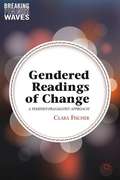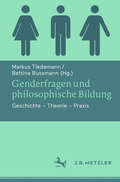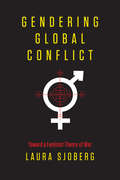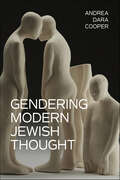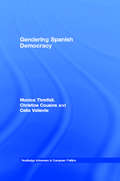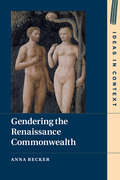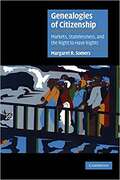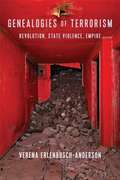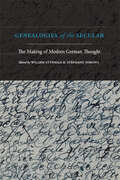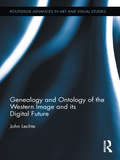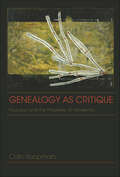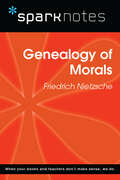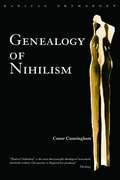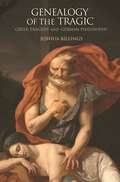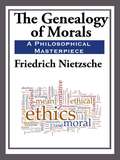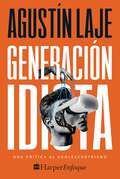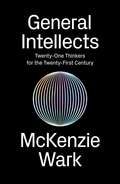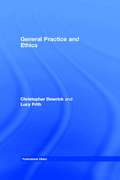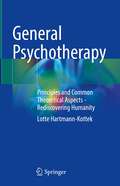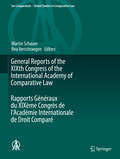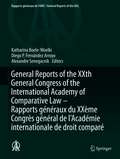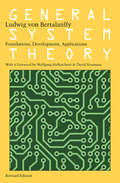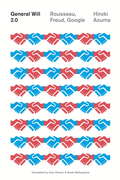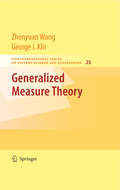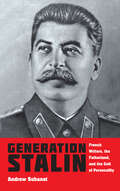- Table View
- List View
Gendered Readings Of Change
by Clara FischerThis book develops a unique theory of change by drawing on American philosophy and contemporary feminist thought. Via a select history of ancient Greek and Pragmatist philosophies of change, Fischer argues for a reconstruction of transformation that is inclusive of women's experiences and thought.
Genderfragen und philosophische Bildung: Geschichte - Theorie - Praxis
by Carolin Seyffert Anne-Marie Leiblich Juliane Köhler Sophia Beyer Mario KötterMit diesem Band wird eine Lücke in der philosophischen Fachdidaktik geschlossen. Ein historischer Teil stellt zunächst bei gleichzeitig kritischer Diskussion Autorinnen und Autoren vor, die den Geschlechterdiskurs bestimmt haben. Danach wird ein Überblick über die sexuelle und geschlechtliche Vielfalt, ihre Grundlagen und Ausdifferenzierungen gegeben. In theoretischen Abhandlungen geht es anschließend um die Relevanz der Genderforschung für das Selbstverständnis philosophischer Bildung. Praxisspezifische Beiträge demonstrieren schließlich, wie Themen und Aspekte der Genderproblematik für verschiedene Altersstufen und Schulformen aufbereitet werden können. Mit 2 Unterrichtsplanungen.
Gendering Global Conflict: Toward a Feminist Theory of War (Gender And Global Politics Ser.)
by Laura SjobergLaura Sjoberg positions gender and gender subordination as key factors in the making and fighting of global conflict. Through the lens ofgender, she examines the meaning, causes, practices, and experiences of war, building a more inclusive approach to the analysis of violent conflict between states.Considering war at the international, state, substate, and individual levels, Sjoberg's feminist perspective elevates a number of causal variables in war decision-making. These include structural gender inequality, cycles of gendered violence, state masculine posturing, the often overlooked role of emotion in political interactions, gendered understandings of power, and states' mistaken perception of their own autonomy and unitary nature. Gendering Global Conflict also calls attention to understudied spaces that can be sites of war, such as the workplace, the household, and even the bedroom. Her findings show gender to be a linchpin of even the most tedious and seemingly bland tactical and logistical decisions in violent conflict. Armed with that information, Sjoberg undertakes the task of redefining and reintroducing critical readings of war's political, economic, and humanitarian dimensions, developing the beginnings of a feminist theory of war.
Gendering Modern Jewish Thought (New Jewish Philosophy and Thought)
by Andrea Dara CooperThe idea of brotherhood has been an important philosophical concept for understanding community, equality, and justice. In Gendering Modern Jewish Thought, Andrea Dara Cooper offers a gendered reading that challenges the key figures of the all-male fraternity of twentieth-century Jewish philosophy to open up to the feminine.Cooper offers a feminist lens, which when applied to thinkers such as Franz Rosenzweig and Emmanuel Levinas, reveals new ways of illuminating questions of relational ethics, embodiment, politics, and positionality. She shows that patriarchal kinship as models of erotic love, brotherhood, and paternity are not accidental in Jewish philosophy, but serve as norms that have excluded women and non-normative individuals.Gendering Modern Jewish Thought suggests these fraternal models do real damage and must be brought to account in more broadly humanistic frameworks. For Cooper, a more responsible and ethical reading of Jewish philosophy comes forward when it is opened to the voices of mothers, sisters, and daughters.
Gendering Spanish Democracy (Routledge Advances in European Politics #Vol. 20)
by Monica Threlfall Christine Cousins Celia ValienteThis book provides an up-to-date critical assessment of gender in Spain with reference to the key social and political fields. It addresses aspects of women's experience such as the public spheres of elective politics, public policy-making and the labour market. This is underpinned by an in-depth analysis of underlying dynamics and structures that contribute to shaping gender relations in Spain, including women's activism, the family and the state social security system.
Gendering the Renaissance Commonwealth (Ideas in Context #123)
by Anna K. BeckerThis pioneering and innovative study challenges modern assumptions of what constitutes the political and the public in Renaissance thought. Offering gendered readings of a wide array of fifteenth- and sixteenth-century political thinkers, with a particular focus on the two prime thinkers of the early modern state, Niccolò Machiavelli and Jean Bodin, Anna K. Becker reconstructs a neglected but important classical tradition in political thought. Exploring how 'the political' was incorporated into a wide array of 'private' or 'apolitical' topics by early modern thinkers, Becker demonstrates how both republican and absolutist thinkers - the two poles which organise early modern political thought - relied on gendered justifications. In doing so, she reveals how the foundations of the modern state were significantly shaped by gendered concerns.
Genealogies of Citizenship: Markets, Statelessness, and the Right to Have Rights (Cambridge Cultural Social Studies)
by Margaret R. SomersGenealogies of Citizenship is a remarkable rethinking of human rights and social justice. As global governance is increasingly driven by market fundamentalism, growing numbers of citizens have become socially excluded and internally stateless. <p><p> Against this movement to organize society exclusively by market principles, Margaret Somers argues that socially inclusive democratic rights must be counter-balanced by the powers of a social state, a robust public sphere and a relationally-sturdy civil society. Through epistemologies of history and naturalism, contested narratives of social capital, and Hurricane Katrina's racial apartheid, she warns that the growing authority of the market is distorting the non-contractualism of citizenship; rights, inclusion and moral worth are increasingly dependent on contractual market value. <p><p> In this pathbreaking work, Somers advances an innovative view of rights as public goods rooted in an alliance of public power, political membership, and social practices of equal moral recognition - the right to have rights.
Genealogies of Terrorism: Revolution, State Violence, Empire (New Directions in Critical Theory #66)
by Verena Erlenbusch-AndersonWhat is terrorism? What ought we to do about it? And why is it wrong? We think we have clear answers to these questions. But acts of violence, like U.S. drone strikes that indiscriminately kill civilians, and mass shootings that become terrorist attacks when suspects are identified as Muslim, suggest that definitions of terrorism are always contested. In Genealogies of Terrorism, Verena Erlenbusch-Anderson rejects attempts to define what terrorism is in favor of a historico-philosophical investigation into the conditions under which uses of this contested term become meaningful. The result is a powerful critique of the power relations that shape how we understand and theorize political violence.Tracing discourses and practices of terrorism from the French Revolution to late imperial Russia, colonized Algeria, and the post-9/11 United States, Erlenbusch-Anderson examines what we do when we name something terrorism. She offers an important corrective to attempts to develop universal definitions that assure semantic consistency and provide normative certainty, showing that terrorism means many different things and serves a wide range of political purposes. In the tradition of Michel Foucault’s genealogies, Erlenbusch-Anderson excavates the history of conceptual and practical uses of terrorism and maps the historically contingent political and material conditions that shape their emergence. She analyzes the power relations that make different modes of understanding terrorism possible and reveals their complicity in justifying the exercise of sovereign power in the name of defending the nation, class, or humanity against the terrorist enemy. Offering an engaged critique of terrorism and the mechanisms of social and political exclusion that it enables, Genealogies of Terrorism is an empirically grounded and philosophically rigorous critical history with important political implications.
Genealogies of the Secular: The Making of Modern German Thought (SUNY series in Theology and Continental Thought)
by Willem Styfhals; Stéphane SymonsWhile the concept of secularization is traditionally used to define the nature of modern culture, and sometimes to uncover the theological origins of secular modernity, its validity is being questioned ever more radically today. Genealogies of the Secular returns to the historical, intellectual, and philosophical roots of this concept in the twentieth-century German debates on religion and modernity, and presents a wide range of strategies that German thinkers have applied to apprehend the connection between religion and secularism. In fundamentally heterogeneous ways, these strategies all developed "genealogies of the secular" by tracing modern phenomena back to their religious or theological roots. This book aims to disclose the complex prehistory of the contemporary debates on political theology and postsecularism, and to show how prominent thinkers continue this German tradition today. It explores and assesses the classic theories of secularization that are epitomized in Carl Schmitt's writings on political theology, but also addresses German philosophers whose work has been rarely associated with secularization, including Walter Benjamin, Ernst Cassirer, Martin Heidegger, Immanuel Kant, and Hannah Arendt. Attention is also paid to two thinkers whose role in these discourses has not been fully explored yet: Jacob Taubes and Jan Assmann. By introducing their thinking on religion, politics, and secularization, the book also makes two of their own key texts available to an English-language readership.
Genealogy and Ontology of the Western Image and its Digital Future (Routledge Advances in Art and Visual Studies)
by John LechteWith the emerging dominance of digital technology, the time is ripe to reconsider the nature of the image. Some say that there is no longer a phenomenal image, only disembodied information (0-1) waiting to be configured. For photography, this implies that a faith in the principle of an "evidential force" – of the impossibility of doubting that the subject was before the lens – is no longer plausible. Technologically speaking, we have arrived at a point where the manipulation of the image is an ever-present possibility, when once it was difficult, if not impossible. What are the key moments in the genealogy of the Western image which might illuminate the present status of the image? And what exactly is the situation to which we have arrived as far as the image is concerned? These are the questions guiding the reflections in this book. In it we move, in Part 1, from a study of the Greek to the Byzantine image, from the Renaissance image and the image in the Enlightenment to the image as it emerges in the Industrial Revolution. Part 2 examines key aspects of the image today, such as the digital and the cinema image, as well as the work of philosophers of the image, including: Roland Barthes, Walter Benjamin, Gilles Deleuze, Jean-Paul Sartre and Bernard Stiegler.
Genealogy as Critique: Foucault and the Problems of Modernity (American Philosophy)
by Colin KoopmanViewing Foucault in the light of work by Continental and American philosophers, most notably Nietzsche, Habermas, Deleuze, Richard Rorty, Bernard Williams, and Ian Hacking, Genealogy as Critique shows that philosophical genealogy involves not only the critique of modernity but also its transformation. Colin Koopman engages genealogy as a philosophical tradition and a method for understanding the complex histories of our present social and cultural conditions. He explains how our understanding of Foucault can benefit from productive dialogue with philosophical allies to push Foucaultian genealogy a step further and elaborate a means of addressing our most intractable contemporary problems.
Genealogy of Morals (SparkNotes Philosophy Guide)
by SparkNotesGenealogy of Morals (SparkNotes Philosophy Guide) Making the reading experience fun! SparkNotes Philosophy Guides are one-stop guides to the great works of philosophy–masterpieces that stand at the foundations of Western thought. Inside each Philosophy Guide you&’ll find insightful overviews of great philosophical works of the Western world.
Genealogy of Nihilism (Routledge Radical Orthodoxy)
by Conor CunninghamThis text re-reads Western history in the light of nihilistic logic, which pervades two millennia of Western thought. From Parmenides to Alain Badiou, via Plotinus, Avicenna, Duns Scotus, Ockham, Descartes, Spinoza, Kant, Hegel, Heidegger, Sartre, Lacan, Deleuze and Derrida, a genealogy of nothingness can be witnessed in development, with devastating consequences for the way we live.
Genealogy of the Tragic: Greek Tragedy and German Philosophy
by Joshua BillingsWhy did Greek tragedy and "the tragic" come to be seen as essential to conceptions of modernity? And how has this belief affected modern understandings of Greek drama? In Genealogy of the Tragic, Joshua Billings answers these and related questions by tracing the emergence of the modern theory of the tragic, which was first developed around 1800 by thinkers associated with German Idealism. The book argues that the idea of the tragic arose in response to a new consciousness of history in the late eighteenth century, which spurred theorists to see Greek tragedy as both a unique, historically remote form and a timeless literary genre full of meaning for the present. The book offers a new interpretation of the theories of Schiller, Schelling, Hegel, Hölderlin, and others, as mediations between these historicizing and universalizing impulses, and shows the roots of their approaches in earlier discussions of Greek tragedy in Germany, France, and England. By examining eighteenth-century readings of tragedy and the interactions between idealist thinkers in detail, Genealogy of the Tragic offers the most comprehensive historical account of the tragic to date, as well as the fullest explanation of why and how the idea was used to make sense of modernity. The book argues that idealist theories remain fundamental to contemporary interpretations of Greek tragedy, and calls for a renewed engagement with philosophical questions in criticism of tragedy.
Geneaology of Morals
by Friedrich NietzscheMajor work on ethics, by one of the most influential thinkers of the last two centuries, deals with master/slave morality and modern man's current moral practices; the evolution of man's feelings of guilt and bad conscience; and how ascetic ideals help maintain human life under certain conditions.
Generación idiota: Una crítica al adolescentrismo
by Agustin LajeGeneración idiota nos ofrece una inmersión profunda en la desaparición de la sociedad intergeneracional y el auge de la mentalidad adolescente, que ha causado un gran daño a la política y a la sociedad.En la continuación de su best seller internacional La batalla cultural, el afamado escritor, politólogo y conferencista Agustín Laje presenta Generación idiota: Una crítica al adolescentecentrismo. Según Agustín, las ideologías centradas en la adolescencia del siglo XXI están en auge. Como resultado, los adolescentes están gobernando el mundo. Rigen la forma de la cultura, estructuran la forma de la política, inspiran los cambios de nuestro lenguaje, imponen sus preferencias estéticas y dominan el imaginario postindustrial y el sistema de consumo. Las instituciones básicas, como la familia, también están fuera de lugar en estas generaciones adolescentes.El libro está dividido en cinco capítulosCapítulo 1 – Una investigación sobre el papel y el poder de los ancianos a lo largo de la historia y su caída con el advenimiento de las sociedades modernasCapítulo 2 – La caracterización y explicación de la "sociedad adolescente", el idiota posmoderno, y el gran tema de la identidad que está omnipresente y arraigado en nuestra sociedadCapítulo 3 – El papel de la moda, el entretenimiento y la tecnología digital y cómo han afectado y moldeado la cultura y la política del siglo XXICapítulo 4 – La expropiación del poder de la familia en la sociedad, la omnipresencia del adoctrinamiento en la educación y el devastador poder socializador de los medios de comunicación de masasCapítulo 5 – Agustín cierra ofreciendo un modelo de rebelión muy diferente para la Nueva Derecha (a la que vuelve a expresar su apoyo), cómo escapar de la idiotez política, y rebelarse de verdad contra el sistema establecido.Si estás cansado del adoctrinamiento más descarado de los medios de comunicación, las escuelas, las universidades y, sobre todo, de nuestros hijos, querrás leer Generación idiota, en la que Laje ofrece un modelo particular de rebelión para la Nueva Derecha. Escapemos juntos el idiotismo político y rebelarnos contra el sistema establecido. ¡Manos a la obra!Idiot GenerationIdiot Generation offers a deep dive into the demise of the transgenerational society and the rise of the adolescent mentality, which has caused great damage to politics and society.In the follow-up to his international bestseller The Culture Battle, famed writer, political scientist, and lecturer Agustín Laje presents Idiot Generation: A Critique of Adolescentcentrism.According to Agustin, adolescent-centered ideologies of the 21st century are rampant. As a result, adolescents are ruling the world. They govern the shape of culture, structure the shape of politics, inspire the changes in our language, impose their aesthetic preferences, and dominate post-industrial imagery and the consumer system. Basic institutions, such as the family, are also out of place in these adolescent generations.
General Intellects: Twenty-Five Thinkers for the Twenty-First Century
by Mckenzie WarkA guide to the thinkers and the ideas that will shape the futureWhat happened to the public intellectuals that used to challenge and inform us? Who is the Sartre or De Beauvoir of the internet age? General Intellects argues that we no longer have such singular figures, but we do have general intellects whose writing could, if read together, explain our times. Covering topics such as culture, politics, work, technology, and the Anthropocene, each chapter is a concise account of an individual thinker, providing useful context and connections to the work of the others. McKenzie Wark’s distinctive readings are appreciations, but are also critical of how neoliberal universities militate against cooperative intellectual work to understand and change the world. The thinkers included are Amy Wendling, Kojin Karatani, Paolo Virno, Yann Moulier Boutang, Maurizio Lazzarato, Franco “Bifo” Berardi, Angela McRobbie, Paul Gilroy, Slavoj i ek, Jodi Dean, Chantal Mouffe, Wendy Brown, Judith Butler, Azumo Hiroki, Paul B. Préciado, Wendy Chun, Timothy Morton, Quentin Meillassoux, Isabelle Stengers, and Donna Haraway.
General Practice and Ethics (Professional Ethics)
by Christopher Dowrick Lucy FrithExplores the ethical issues faced by GPs in their everyday practice, addressing two central themes; the uncertainty of outcomes and effectiveness in general practice and the changing pattern of general practitioners' responsibilities.
General Psychotherapy: Principles and Common Theoretical Aspects - Rediscovering Humanity
by Lotte Hartmann-KottekThis book highlights common similarities between the various schools of psychotherapy. It provides psychotherapists with the underlying neurophysiological, developmental psychological and relationship-oriented matrix (basic needs and their regulation, deficits, trauma and conflict processing patterns, including accompanying exercises) as well as opportunities for healing correction and stabilisation - and the ways in which to apply these methods in a therapeutically mindful way for the benefit of the patient. The new university-based psychotherapy training covers the four fundamental schools of psychotherapy, i.e. the previous standard approaches plus the systemic and humanistic ones. Focusing on the common ground builds bridges of understanding and encourages collaboration. This expanded, new range of methods to access patients constitutes a substantial development in the field of psychotherapy and will also influence the psychotherapy practice of experienced colleagues. Written for medical and psychological psychotherapists, psychosomatic doctors, psychiatrists and other specialists with additional psychotherapeutic qualifications, and for students of psychotherapy.
General Reports of the XIXth Congress of the International Academy of Comparative Law Rapports Généraux du XIXème Congrès de l'Académie Internationale de Droit Comparé
by Martin Schauer Bea VerschraegenThis book deals with convergences of legal doctrine despite jurisdictional, cultural, and political barriers, and of divergences due to such barriers, examining topics that are of vital importance to contemporary legal scholars. Written by leading scholars from more than twenty countries, its thirty-two chapters present a comparative analysis of cutting-edge legal topics of the 21st century. While each of the countries covered stands alone as a sovereign state, in a technologically advanced world their disparate systems nonetheless show comparable strategies in dealing with complex legal issues. The book is a critical addition to the library of any scholar hoping to keep abreast of the major trends in contemporary law. It covers a vast area of topics that are dealt with from a comparative point of view and represents the current state of law in each area.
General Reports of the XXth General Congress of the International Academy of Comparative Law - Rapports généraux du XXème Congrès général de l'Académie internationale de droit comparé (Ius Comparatum - Global Studies in Comparative Law #50)
by Diego P. Fernández Arroyo Katharina Boele-Woelki Alexandre SenegacnikThis book explores convergences of legal doctrine despite jurisdictional, cultural and political barriers, as well as divergences due to such barriers, examining topics that are of vital importance to contemporary legal scholars. Written by leading experts from all continents, its 26 chapters present a comparative analysis of cutting-edge legal issues of the 21st century. While each of the countries covered stands alone as a sovereign state, in a technologically advanced world their disparate systems nonetheless show comparable strategies in dealing with complex legal issues. Several of the chapters show how, in addition to state normative production and state adjudication, a growing panoply of non-state instruments and non-state adjudication are becoming more and more central to the legal field. This book is a key addition to the library of any scholar wanting to keep abreast of the major trends in contemporary law. Representing the current state of law in a vast range of areas, it covers each topic from a comparative perspective. Cet ouvrage, en examinant des sujets d'une importance vitale pour les juristes contemporains, traite des convergences de la doctrine juridique malgré les barrières juridictionnelles, culturelles et politiques ainsi que des divergences dues à ces barrières. Écrits par d'éminents universitaires de tous les continents, ses 26 chapitres présentent une analyse comparative de sujets juridiques majeurs du 21e siècle. Dans un monde technologiquement avancé, bien que chaque pays analysé dans cet ouvrage demeure autonome en tant qu'État souverain, l’ensemble des systèmes disparates présente néanmoins des stratégies comparables pour traiter des questions juridiques complexes. En outre, plusieurs chapitres montrent comment, en plus de la production normative et de la résolution des différends étatiques, la panoplie croissante de différents types d'instruments non étatiques et de résolution non étatique des différends devient de plus en plus centrale dans la sphère juridique. Cet ouvrage est un ajout essentiel à la bibliothèque de tout universitaire souhaitant se tenir au courant des principales tendances du droit contemporain. Il couvre un vaste domaine de sujets traités d'un point de vue comparatif et représente l'état actuel du droit dans chaque domaine.
General System Theory: Foundations, Development, Applications
by David Rousseau Ludwig Von Bertalanffy Wolfgang HofkirchnerThe classic book on a major modern theory Bertalanffy's selected writings on his theory of laws applicable to virtually every scientific field. This conceptual approach has had a profound impact on biology, economics, psychology, and demography, with new relevancies today. The new foreword by University of Vienna system theory professor, Wolfgang Hofkirchner, and Centre for Systems Philosophy director, David Rousseau, discusses the theory's contemporary applications.
General Will 2.0
by John Person Hiroki AzumaAccording to Azuma, the collective will and the general social contract has changed the world's political landscape over the last couple of years. Azuma looks back at Rousseau and Freud then forward to Twitter and Google to express how man deals with their part of the collective will through time. Azuma challenges society's perceptions of general will by looking at three philosophies through both time and technology. Azuma's unique analysis can be as compelling as fiction while making readers feel enlightened in the process.
Generalized Measure Theory
by Zhenyuan Wang George J. KlirGeneralized Measure Theory examines the relatively new mathematical area of generalized measure theory. The exposition unfolds systematically, beginning with preliminaries and new concepts, followed by a detailed treatment of important new results regarding various types of nonadditive measures and the associated integration theory. The latter involves several types of integrals: Sugeno integrals, Choquet integrals, pan-integrals, and lower and upper integrals. All of the topics are motivated by numerous examples, culminating in a final chapter on applications of generalized measure theory. Some key features of the book include: many exercises at the end of each chapter along with relevant historical and bibliographical notes, an extensive bibliography, and name and subject indices. The work is suitable for a classroom setting at the graduate level in courses or seminars in applied mathematics, computer science, engineering, and some areas of science. A sound background in mathematical analysis is required. Since the book contains many original results by the authors, it will also appeal to researchers working in the emerging area of generalized measure theory.
Generation Stalin: French Writers, the Fatherland, and the Cult of Personality
by Andrew SobanetA look at how four French writers of the 1930s, ‘40s, and ‘50s contributed to the rise of Stalin in their country and abroad.Generation Stalin traces Joseph Stalin’s rise as a dominant figure in French political culture from the 1930s through the 1950s. Andrew Sobanet brings to light the crucial role French writers played in building Stalin’s cult of personality and in disseminating Stalinist propaganda in the international Communist sphere, including within the USSR. Based on a wide array of sources—literary, cinematic, historical, and archival—Generation Stalin situates in a broad cultural context the work of the most prominent intellectuals affiliated with the French Communist Party, including Goncourt winner Henri Barbusse, Nobel laureate Romain Rolland, renowned poet Paul Eluard, and canonical literary figure Louis Aragon. Generation Stalin arrives at a pivotal moment, with the Stalin cult and elements of Stalinist ideology resurgent in twenty-first-century Russia and authoritarianism on the rise around the world.“This is an outstanding work of intellectual history. . . . Highly recommended.” —Choice“A landmark study, brilliantly written, containing exemplary scholarship. Sobanet establishes himself with this volume as one of the foremost interpreters of French intellectual life. He brings to his study a cornucopia of historical knowledge and the finesse of a first-class literary critic.” —Lawrence D. Kritzman, editor of The Columbia History of Twentieth-Century French Thought“This is an ambitious project that is well executed, with a readership that is potentially far reaching—with implications for Russian/Stalin studies, French studies, including politics and society, as well as propaganda writing and the role of the media more generally. . . . Generation Stalin is a very timely book.” —Denis M. Provencher, author of Queer French: Globalization, Language, and Sexual Citizenship in France“Sobanet’s study of “Generation Stalin” and the four writers he associates with the group, Henri Barbusse, Romain Rolland, Paul Eluard, and Louis Aragon, is, quite simply, magisterial. Written in lucid prose informed by meticulous and wide-ranging scholarship including archival material, books, essays, press items, and other relevant documents, the book provides an in-depth study of the rise of the Stalin cult in France.” —Carol J. Murphy, author of The Allegorical Impulse in the Works of Julien Gracq: History as Rhetorical Enactment in “Le Rivage des Syrtes” and “Un Balcon en forêt”
